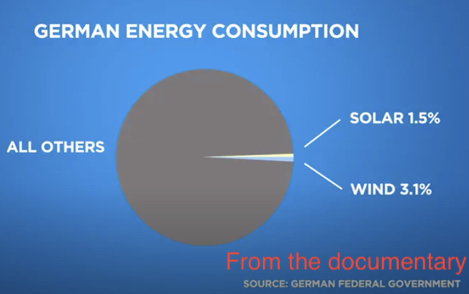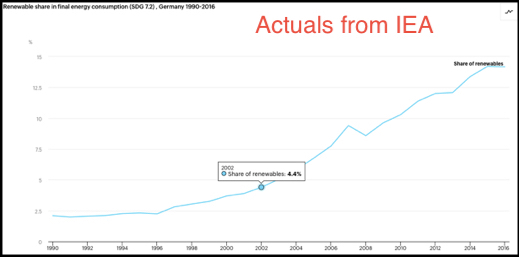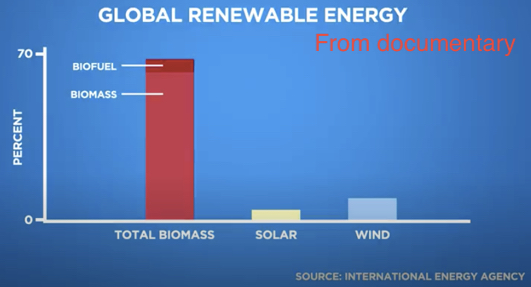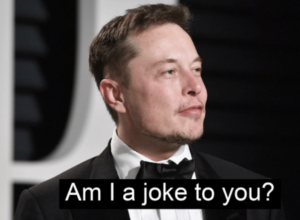
The movie produced by Micheal Moore who’s highly regarded amongst the progressive & environmental groups, has drawn some serious flack from the same groups for the movie not being scientifically accurate & providing ammo to climate change deniers. I agree with this characterization.
I’ve broken up my review into 3 parts:
- Factual mistakes that are outright wrong. This is not something to be expected from an Oscar winning producer. I’ve highlighted 3 errors that I came across:

A. The documentary mentions that even though Germany has been at the forefront of renewable energy generation for decades, the total energy generated from renewable sources is still under 5%. The underlying implication of this is that even if other countries aggressively push for renewable energy, there will not be able to vastly transform their energy sources. But a quick look at International Energy Agency (IEA) website shows that Germany obtains 15% of it’s energy from renewable sources. The movie was correct in 2002, but has been wrong ever since
B. The documentary presents another graph showing that globally about 70% of renewable energy is actually generated from biomass – burning wood chips, etc. Again, looking at the data from IEA proves that this information is also wrong
C. The documentary claims that solar & wind require more energy to manufacture (wind turbines, solar panels, etc) than the electricity that can be generated in the lifetime of those installations therefore implying that these technologies are not net favourable to the climate. There are several issues with this. Key one being that this claim is not true. National Renewable Energy Lab (NREL) showed back in 2004 that multi-crystilline PV panel has an energy payback period of about 3.5 years – meaning that it takes 3.5 years to recover the energy input that has gone in to produce these panels. Assuming a solar panel’s usable lifetime is 25 years, it produces 21.5 years worth of excess energy. Research has shown that payback for Wind turbines is much lesser – 7-9 months.


2. Questionable arguments – Misleading information or ignorance:
1. The documentary argues that electric vehicles are not sustainable because the electricity they use is primarily generated from coal. The makers are either unaware or have decided to ignore that fact that source of electricity for EVs can be & is being made progressively cleaner such that at sometime in the near future we can expect transporation to be nearly green. Companies such are Telsa are driving towards that clean energy generation & consumption economy.
Here’s Elon Musk saying “am I a joke to you?”:

2. The documentary interviews few energy experts who mention that despite the abundance of clean energy alternatives, conventional energy sources such as coal & gas plants have to be run in order to support base load. But just because you have to continue using conventional sources for baseload doesn’t mean that we shouldn’t incorporate more solar. Also, this is a well known limitation which will persist until storage battery technology become economical.
3. Reasonable arguments that are food for thought –
A. Biomass is not carbon neutral – The documentary dedicates an unreasonable amount of time to show that biomass energy is not carbon neutral. This article discusses the subjective nature of biomass energy. Majority of biomass plants rely on wood chips or pellets prepared by harvesting forests. These were initially thought to be carbon neutral & since they can be used along with existing power infrastructure, they were quickly adopted as clean energy in the US & EU. But according to latest research this approach is not as carbon neutral as originally thought. As shown in the documentary, renowned environmentalist Bill McKibben, who originally supported biomass came back against it last year as described in this New Yorker article. And although the documentary emphasizes Bill’s pro-biomass stance, his reversion is not mentioned anywhere. Nervertheless, good on the part of documentary for bringing focus on this important topic.
B. Sustainable investing portfolios aren’t completely green – the documentary walks through two sample green portfolios. One from 350.org & another from Sierra Club that recommend banks, tech companies, tar sands extraction companies (wow!), etc. I myself, having reviewed multiple such portfolio, can attest to the fact that most of these “green funds” do not recommend only green energy or clean tech firms. Key reason for this being that these mutual funds or ETFs base their recommendations on a general principle of not directly investing in fossil fuel companies – meaning that companies that are indirectly part of the value chain such as banks, mining companies, etc are fair game. Secondly, the recommendations are based on companies’ ESG score – Environment, Society & Governance – a metric that most of the large corporations have figured out how to score high on. The onus is on the fund managers to ensure these green funds are stay true to the spirit of what their customers are trying to achieve in these funds.
Conclusion:
In all fairness, Michael Moore is not a climate change denier, so why then produce such a movie that filled with factual errors & rejects the progress we’ve made in the environmental movement?
It goes back to one of the core themes Micheal Moore brings up in all of his movies – how corporatism is taking over our society with primary objective being to ensure that we continue our excessive consumeristic ways which ensure these corporations’ profits. The documentary provides examples of biomass billionaires funding environmental organizations, asset management companies supporting clearing of Amazon forests, big banks funding ethanol manufacturing from sugar cane grown in clear cut forest, etc.
Had the documentary focussed on the last few things mentioned about, gotten their facts straight & not made well respected environmentalists such as Bill McKibben & Al Gore collateral damage, this documentary would have made the impact that their makers wanted it to make.
P.S – checkout this video we have made on this topic:
